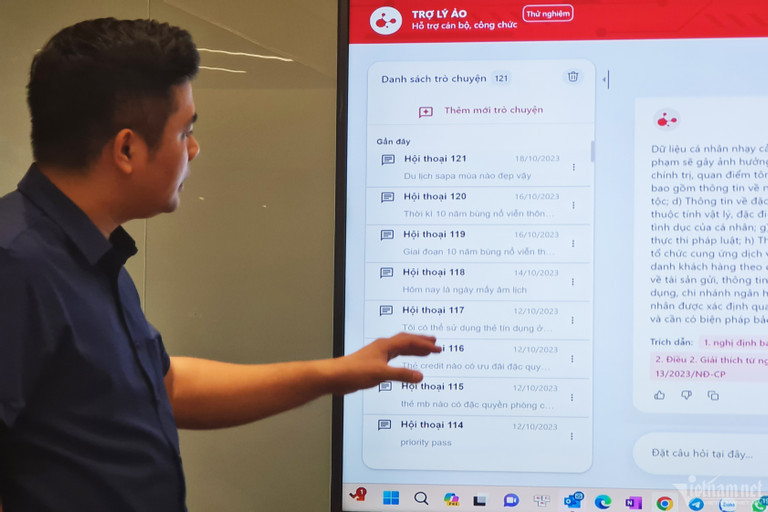
Vietnamese technology firms are developing four virtual assistants to serve officers, including a legislative virtual assistant to detect conflicts in compiling legal documents; a court virtual assistant to ease judges’ workload; a virtual assistant to support the civil apparatus; and a virtual assistant to give judicial support to people.
Of these, the virtual assistant serving Vietnam’s court has been brought into use and has helped reduce 30 percent of workload and optimize court operation time. With the new assistant, many judges have changed their working habits.
In July 2023, as per the request of the National Agency for Digital Transformation, the Ministry of Information and Communications (MIC) approved a plan to research and experiment the development the Vietnamese language model and create a basic virtual assistant vision for state officers, and a version for MIC.
These are the first steps taken by Vietnam in order to utilize AI (artificial intelligence) to support and improve the efficiency of the civil apparatus.
According to Tran Manh Quan from Viettel Cyberspace, a virtual assistant is software that helps users perform operations based on commands, or help look up for information in certain fields.
Virtual assistants will be developed towards personalization. The more they are used, the smarter they will become.
Quan said Viettel pursues the principle that Vietnam’s virtual assistants are not used to give answers to all kinds of questions, but instead to serve specific fields. The narrowing of the operation scope of virtual assistants will help cut costs.
“Previously, the knowledge of civil servants and long-time workers was often hidden and could not be maintained through generations. With the emergence of AI, virtual assistant technology will help accumulate hidden knowledge through communications with experts, thereby storing and transferring their knowledge to newcomers through virtual assistants."
Management agencies are approaching the use of virtual assistants in four fields – legislative, executive, judicial and public service.
In the future, virtual assistants will be a useful tool to take care of customers, sell products, answer questions about legal documents and public administrative procedures, provide knowledge and serve a quick look-up for professional data, and give advice on public services.
Regarding the development of virtual assistants for civil officers and for MIC, Quan said the most important thing is building a large Vietnamese language model to prevent data from being leaked.
“Large language models have been ‘learning’ everywhere on the internet, with both good and bad information. If Vietnam uses the models, it won’t be able to control information. It is necessary to build a clean large language model of Vietnam and for Vietnamese people,” the expert said.
Civil virtual assistant
Chris Kelly from Dell Technologies said with the huge data created daily, it can be improved effectively thanks to AI.
More importantly, the idea focuses on providing automation and effects to procedural and repeated works. This allows people to operate better and have more time to create other values.
However, the expert stressed that Vietnam must not ‘forget’ to ensure security when developing virtual assistants.
“The government needs to control the right to access/exit and regulate systems. Rights must be granted to right officers when this is really necessary,” he said.
“Also, the answers and instructions provided to civil servants must suit Vietnamese culture,” he added.
The virtual assistant in courts has been put into official operation with more than 3 million users. There are about 5,000-6,000 questions and answers and searches per day. As many as 1,031 reviews and 99 percent of users have praised the usefulness of the product. The percentage of unsatisfied users is only 5.22 percent.
Viettel, the developer of the virtual assistant, said the technology has helped reduce 30 percent of the workload compared with traditional operations.
Trong Dat